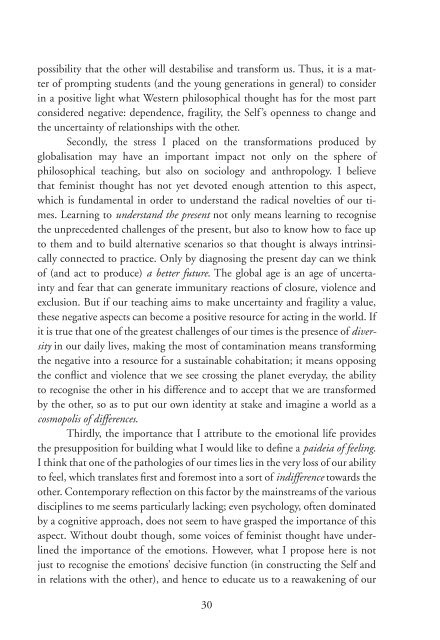Teaching Subjectivity. Travelling Selves for Feminist ... - MailChimp
Teaching Subjectivity. Travelling Selves for Feminist ... - MailChimp
Teaching Subjectivity. Travelling Selves for Feminist ... - MailChimp
You also want an ePaper? Increase the reach of your titles
YUMPU automatically turns print PDFs into web optimized ePapers that Google loves.
possibility that the other will destabilise and trans<strong>for</strong>m us. Thus, it is a matter<br />
of prompting students (and the young generations in general) to consider<br />
in a positive light what Western philosophical thought has <strong>for</strong> the most part<br />
considered negative: dependence, fragility, the Self’s openness to change and<br />
the uncertainty of relationships with the other.<br />
Secondly, the stress I placed on the trans<strong>for</strong>mations produced by<br />
globalisation may have an important impact not only on the sphere of<br />
philosophical teaching, but also on sociology and anthropology. I believe<br />
that feminist thought has not yet devoted enough attention to this aspect,<br />
which is fundamental in order to understand the radical novelties of our times.<br />
Learning to understand the present not only means learning to recognise<br />
the unprecedented challenges of the present, but also to know how to face up<br />
to them and to build alternative scenarios so that thought is always intrinsically<br />
connected to practice. Only by diagnosing the present day can we think<br />
of (and act to produce) a better future. The global age is an age of uncertainty<br />
and fear that can generate immunitary reactions of closure, violence and<br />
exclusion. But if our teaching aims to make uncertainty and fragility a value,<br />
these negative aspects can become a positive resource <strong>for</strong> acting in the world. If<br />
it is true that one of the greatest challenges of our times is the presence of diversity<br />
in our daily lives, making the most of contamination means trans<strong>for</strong>ming<br />
the negative into a resource <strong>for</strong> a sustainable cohabitation; it means opposing<br />
the conflict and violence that we see crossing the planet everyday, the ability<br />
to recognise the other in his difference and to accept that we are trans<strong>for</strong>med<br />
by the other, so as to put our own identity at stake and imagine a world as a<br />
cosmopolis of differences.<br />
Thirdly, the importance that I attribute to the emotional life provides<br />
the presupposition <strong>for</strong> building what I would like to define a paideia of feeling.<br />
I think that one of the pathologies of our times lies in the very loss of our ability<br />
to feel, which translates first and <strong>for</strong>emost into a sort of indifference towards the<br />
other. Contemporary reflection on this factor by the mainstreams of the various<br />
disciplines to me seems particularly lacking; even psychology, often dominated<br />
by a cognitive approach, does not seem to have grasped the importance of this<br />
aspect. Without doubt though, some voices of feminist thought have underlined<br />
the importance of the emotions. However, what I propose here is not<br />
just to recognise the emotions’ decisive function (in constructing the Self and<br />
in relations with the other), and hence to educate us to a reawakening of our<br />
30

















